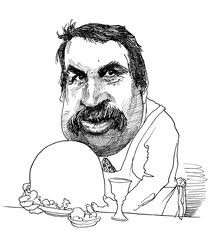 Thomas L. Friedman. |
Given his importance and the originality of his ideas on Arab-Israeli relations, Friedman's analysis of this topic deserves a look.
His signature concept is applying globalization theory to the conflict. "Globalization" is shorthand for aligning one's educational, financial, and governmental institutions in line with the demands of the international marketplace, so to compete effectively in the world economy.
If Arabs and Israelis would concentrate on fulfilling the imperatives of globalization, he argues, they would not only live better but also find themselves too busy making money to hate each other.
Computers, the Internet, prosperity, and modernity are his solution to nationalistic feuding. Educating one's children beats having them throw rocks; raising one's standard of living means more than maintaining sovereign control over holy places. In brief, economics trumps politics.
Friedman's writings often argue this thesis. A visit to southern Lebanon after the May 2000 withdrawal of Israeli troops, for example, prompted him to declare that war with Israel "is over as far as Lebanon is concerned." The occupation done with, old hatreds could now "be balanced by other interests and aspirations for growth."
 Thomas L. Friedman. |
Unfortunately for Friedman's thesis (and Clinton's Nobel Prize aspirations), many Middle Easterners are still preoccupied by those "encrusted olive-tree politics" he has relegated to the dustbin of history.
For a while, the columnist could blow them off as irrelevant anachronisms. Thus in 1999 he dismissed Hafez al-Assad, the late all-powerful Syrian dictator, as "the leader of a failing state" and (no less) as "a deer frozen in history's headlights."
Of late, Friedman has woken up to Middle Eastern realities. How could he not? The intifada, which has cost the Palestinians hugely in economic terms, reveals how destroying Israel remains a higher priority to them than the good life. To make sure none of their money reaches Israel, Egyptians are back-pedaling from the world economy. Saddam Hussein opts for weapons of mass destruction over a decent life for the Iraqi people.
To his credit, Friedman has candidly acknowledged his mystification. "I don't understand" the Arab masses' enthusiasm for Saddam, he writes. Palestinian violence has left advocates of the Oslo process, he admits, "feeling like fools." "Goodbye, Syria. Goodbye, Nasdaq. Hello, oil crisis" is his bewildered response to Syrian saber-rattling along the Lebanese border with Israel.
Actually, his puzzlement runs yet deeper, to the very premises of globalization: "What troubles me most about the mood on the Arab street today is the hostility I detect there to modernization, globalization, democratization, and the information revolution."
Why, he wonders, are Egyptians, Palestinians, and Iraqis unwilling to forgo political dreams for a nice apartment and a late-model car? The answer is simple. Arab hostility toward globalization was there all along but Friedman (along with Clinton) did not want to see it. He overlooked the Middle East's realities and instead imposed onto it an alien pattern.
Sadder but wiser, Thomas Friedman is learning a deep truth about the Middle East. This is one region where politics trumps economics.
Feb. 14, 2001 addendum: For my earlier and later writings on Friedman, see "From Beirut to Jerusalem" and the updates that follow the book review's text.
June 24, 2013 update: Barry Rubin condenses my argument above into a single sentence: "Understanding that Friedman doesn't understand the Middle East, though he has persuaded a big audience otherwise, is the beginning of wisdom on the region." Bingo.
July 11, 2024 update: In an article titled, "What Happened to Thomas Friedman?" Liel Leibovitz writes that "one of America's most talented and influential writers of the last four decades, no longer bothers himself with facts or even original ideas, but prints whatever his friends in the political elite decide should be printed. ... the relationship between Democratic Party leaders and Friedman has become so symbiotic that it's no longer possible to separate one from the other."
Other choice quotes:
- David Samuels, a former senior writer at The New York Times Magazine: "Thomas Friedman is a professional sycophant who speaks in clichés. ... He is the house poet of mediocrity, arrogance, and foolish naivety."
- Michael Doran, a senior fellow at the Hudson Institute: "Friedman is probably unaware that he has become a mouthpiece for the [Biden] administration. He probably believes he is still thinking independently and drawing his own conclusions. It's just a pure coincidence that 100% of his conclusions support the dogmas of the Democratic Party. ... I now read him as one reads columnists in the Russian, Chinese, and Arab press: no longer to learn new and surprising things about the world, but to see what the regime wants me to believe."
